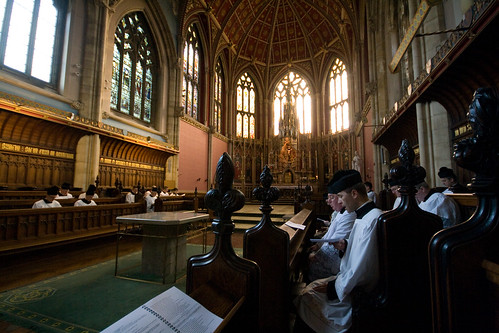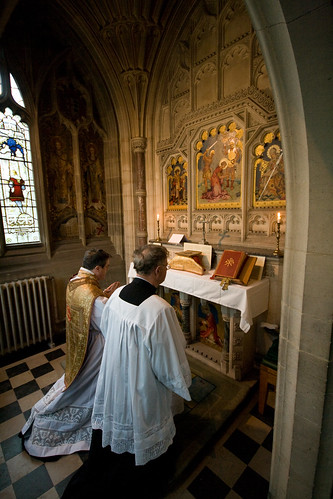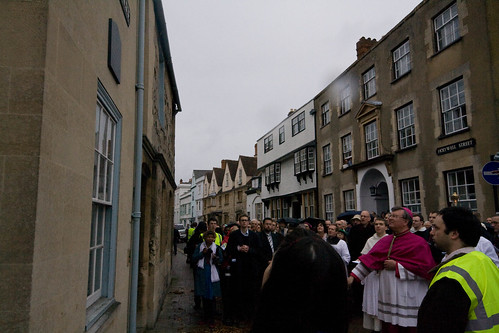I met Dr John Rao for the first time at the conclusion of the Chartres Pilgrimage. For the last few years, however, I have been an avid listener to his and other Roman Forum talks dowloaded from keepthfaith.org. Unpolemical, systematic, totally Catholic, they offer an extremely perceptive education in Catholic and history and culture in the commute to work or while you are sitting in traffic jams.
The origin of the mp3s is an annual conference in Italy - it sounds tremendous. Here are more details.
-----------
Dear Friends:
Superlatives can be dangerous, since they set higher standards for success that may be hard to match or surpass. Nevertheless, there is no way that I can avoid stating that the Roman Forum’s 2010 Summer Symposium was a greater success than ever before. More speakers, more participants from a wider international base, more active discussions and debates, more devotions and music, more excursions---in short, more of everything---all contributed to making this year another milestone in the history of the Gardone project. Michael Matt of The Remnant was a major assistance in obtaining this happy result, through an extremely helpful advertising campaign in his newspaper. He has kindly continued this aid by posting a large number of videos from the 2010 Summer Symposium on the Internet. Anyone interested in attending future sessions of what Chris Ferrara has called “the premiere Catholic conference” of the English-speaking world
should go to the Remnant site (www.remnantnewspaper.com) to visit them...and stir his appetite for participation still further.
Summer Symposium on Lake Garda, Italy:
For nearly two weeks during the summer, a small Italian resort on Lake Garda, the largest and most beautiful lake in Italy, is literally transformed into an international Catholic village, with daily traditional masses, lectures, Catholic camaraderie, superb food and wine, and day trips to surrounding sites, such as Venice. For participants, many of whom come back year after year and feel like family, it is a rare and wonderful opportunity to experience Catholic life on the continent where Catholic culture first came to flower.
The Summer Symposium hosts a large international faculty, which has included Dale Ahlquist (President of the G.K. Chesterton Society of America), Christopher A. Ferrara, Esq. (President of the ACLA, writer and pro-life activist), Michael Matt (editor of The Remnant), Fr. Gregory Prendergraft (Fraternity of St. Peter), Dr. Patrick M. Brennan (John F. Scarpa Chair in Legal Studies, University of Villanova), Dr. Brian McCall (University of Oklahoma), Professor John Médaille (University of Dallas), the Rev. Dr. Richard Munkelt (Fairfield University), and myself from the United States; Monsignor Dr. Ignacio Barreiro-Carámbula (Human Life International) and Dr. Danilo Castellano (University of Udine) from Italy; James Bogle, Esq. (Catholic lawyer, activist, and writer) from the United Kingdom; Dr. Miguel Ayuso-Torres (University of Madrid) from Spain, and many others. Faculty and students are served spiritually by a large number of priests from the secular and religious clergy.
Our next Gardone Summer Symposium, entitled New Beginnings and False Starts, will take place between Thursday, June 30th and Monday, July 11th, 2011. It takes its theme from the ever more obvious fact that we are living through an extraordinary turning point in the history of the entire globe, and that this is a situation both hopeful and yet charged with dramatic danger for the life of the Church and Catholic
civilization. We expect much the same faculty to be present, along with the addition of James Kalb (author of The Tyranny of Liberalism) from the United States, Dr. Thomas Stark (Philosophisch-Theologische Hochschule, St. Pölten) from Austria, and Bernard Dumont (editor of Catholica) from France. A special honor will be the participation of Hervé Rolland, President of Notre Dame de Chrétienté, the organization responsible for the annual Chartres Pilgrimage.
Please consult our website (www.romanforum.org) for more complete information on the 2011 Gardone Summer Symposium, as well as all our other future events, including our annual New Year’s Eve Dinner Dance (details on back of this letter), and any additional Modern Image and Catholic Truth programs.
4) Lecture Downloads: 2010 Summer Symposium Lectures will be available through The Remnant Newspaper (www.remnantnewspaper.com). Almost all of the lectures of our History of Christianity program from 1993-2010 can be downloaded to your computer for only one dollar per lecture or
purchase on audiotape at www.keepthefaith.org.
In order to undertake these projects properly, the Roman Forum needs an annual budget of $50,000. Where do these funds go?
Mailings, advertising, books, storage space for them, and use of conference halls alone now cost us at least $15,000 per year. More importantly, college students, priests, and seminarians hoping to attend the Summer Symposium cannot be present without some financial assistance. Although no one on the teaching faculty receives any compensation for his work there, the daily expenses of all those delivering papers in Gardone must also be covered. Aiding both speakers and participants therefore takes up almost all of the rest of our annual budget.
But why should we place such an emphasis upon this Summer Symposium?
Dr. Ayuso-Torres summarized the chief reason in a lecture in Gardone in 2008: “Unless we traditionalists learn to appreciate the universal nature of the Catholic vision and fight for its general recognition and victory, we will all rest contented with our own little parochial piece of that heritage, and destroy the entirety in the process”. My Remnant article on this subject, entitled Are Beauty, Camaraderie, and Talk
Really Expendable? (see jcrao@freeshell.org) underlines the same point. Providing faculty, priests, and students scholarships for such a program can be expensive---but its incalculable fruits will be more and more seen in preaching, teaching, and writing in the years to come. These fruits would be even greater if we could ever realize our greatest dream: the expansion of this magnificent international program into a summer long venture, enabling students to earn college credits for their labors.
The Roman Forum may not be able to promise immediate benefits---like a tax cut---through your aid, but we work, as Thucydides said, with the conviction that what we are doing is being done for eternity. As I have written in the past, we consider every tax-deductible donation we receive to place upon us a serious responsibility to use our resources well and wisely. To show you our appreciation, we have arranged that the intentions of our benefactors be remembered once a month at a traditional Mass offered in Rome by our chaplain, Msgr. Ignacio Barreiro-Carámbula. With the acknowledgment of your donation, of any size, you will receive a note confirming that you have been enrolled in these Masses. I thank you in advance for your generosity.
Sincerely yours in Christ,
John C. Rao, Chairman, D. Phil. Oxford
Assoc. Prof. of History, St. John's University
Make all your tax-deductible donations payable to:
The Roman Forum, 11 Carmine St., Apt. 2C, NY, NY 10014
“Even if the wounds of this shattered world enmesh you, and the sea in turmoil bears you along in but one surviving ship, it would still befit you to maintain your enthusiasm for studies unimpaired. Why should lasting values tremble if transient things fall?”
(Prosper of Aquitaine)
- Posted using BlogPress from my iPhone













